<Back to Index>
- Composer Mikis Theodorakis (Μίκης Θεοδωράκης), 1925
- Composer Manos Hatzidakis (Μάνος Χατζιδάκις), 1925
PAGE SPONSOR
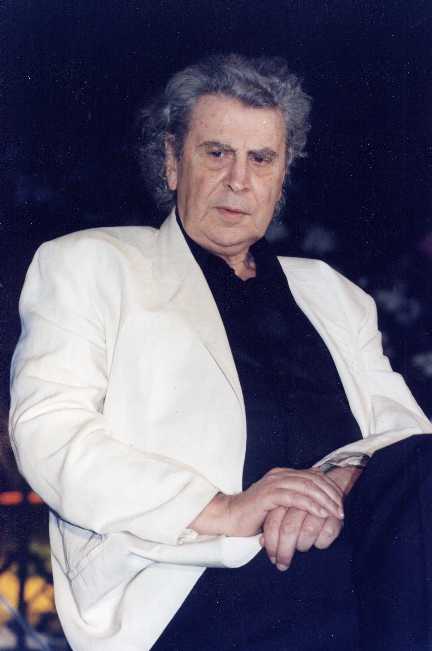
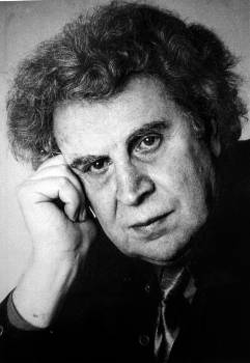
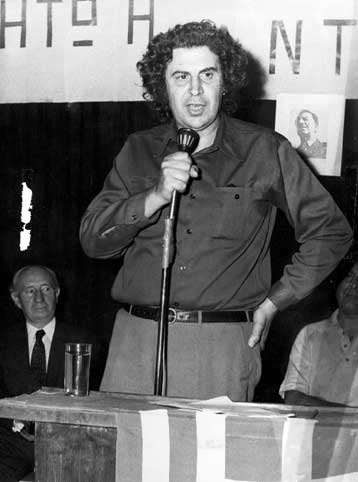
Mikis (Michael) Theodorakis (Greek: Μίκης Θεοδωράκης) (born July 29, 1925) is one of the most renowned Greek songwriters and composers. Internationally, he is probably best known for his songs and for his scores for the films Zorba the Greek (1964), Z (1969), and Serpico (1973).
Politically,
he identified with the left until the late 1980s; in 1989, he ran as an
independent candidate within the center - right New Democracy party in order for the country to come out of the political crisis that had
been created due to the numerous scandals of the government of Andreas Papandreou and
helped to establish a large coalition between conservatives, socialists
and leftists. In 1990 he was elected to the parliament (as in 1964 and
1981), became a government minister under Constantine Mitsotakis,
and fought against drugs and terrorism and for culture, education and
better relations between Greece and Turkey. He continues to speak out in
favor of left liberal causes, Greek - Turkish - Cypriot relations, and
against the War in Iraq. He has consistently opposed oppressive regimes and was the key voice against the Greek Junta 1967 - 1974, which imprisoned him.
Mikis Theodorakis was born on the Greek island of Chios and spent his childhood years in different provincial Greek cities such as Mytilene, Cephallonia, Patras, Pyrgos and Tripoli. His father, a lawyer and a civil servant was from Galata (Crete) and his mother from Cesme (Asia Minor).
Theodorakis's fascination with music began in early childhood; he taught himself to write his first songs without access to musical instruments. In Patras and Pyrgos he took his first music lessons, and in Tripoli, Peloponnese, he gave his first concert at the age of seventeen.
He went to Athens in 1943, and became a member of a Reserve Unit of ELAS. During the Greek Civil War, he was arrested, sent into exile on the island of Icaria and then deported to the island of Makronisos, where he was tortured and twice buried alive.
During the periods when he was not obliged to hide, nor exiled or jailed, he studied from 1943 to 1950 at the Athens Conservatoire under Filoktitis Economidis. In 1950, he finished his studies and took his last two exams "with flying colors". He went to Crete, where he became the "head of the Chania Music School" and founded his first orchestra. At this time he ended what he has called the first period of his musical writing.
In 1954 he traveled with his young wife Myrto Altinoglou to Paris where he entered the Conservatory and studied musical analysis under Olivier Messiaen and conducting under Eugene Bigot. His time in Paris, 1954 – 1959, was his second period of musical writing and a time of intense artistic creation.
His symphonic works: a Piano concerto, his first suite, his first symphony, and his scores for the ballet: Greek Carnival, Le Feu aux Poudres, Les Amants de Teruel, received international acclaim. In 1957, he won the Gold Medal in the Moscow Music Festival; President of the Jury was Dmitri Shostakovitch. In 1959, after the successful performances of Theodorakis's ballet Antigone at Covent Garden in London, the French composer Darius Milhaud proposed him for the American Copley Music Prize - an award of the "William and Noma Copley Foundation", which
later changed its name to "Cassandra Foundation" - as the "Best
European Composer of the Year". His first international scores for the
film Ill Met by Moonlight and Luna de Miel, directors: Michael Powell and Emeric Pressburger, were also very successful: The Honeymoon title song became part of the repertoire of The Beatles.
- Chamber Music: Four String Quartets; Trio four piano, violin, cello; Little Suite for piano; Sonatina for piano; Sonatinas No.1 and No.2 for violin and piano;
- Symphonic music: Assi - Gonia (symphonic movement; Piano Concerto "Helicon"; Symphony No.1 (Proti Simfonia); Suites n° 1, 2 et 3 for orchestre; La Vie et la Mort / Live and Death (for voice and strings); Œdipus Tyrannos (for strings; later for quartet and symphony orchestra); Piano Concerto;
- Ballets: Greek Carnival; Le Feu aux Poudres; Les Amants de Teruel; Antigone;
- Filmscores: The Barefoot Battalion (Greg Tallas); Ill Met by Moonlight and Honeymoon (Powell and Pressburger); Faces in the Dark (David Eady).
In 1960, Theodorakis returned to Greece and his roots in genuine Greek music: With his song cycle Epitaphios he started the third period of his composing and contributed to a cultural revolution in his country. With his most significant and influential works based on the greatest Greek and world poetry – Epiphania (Giorgos Seferis), Little Kyklades (Odysseas Elytis), Axion Esti (Odysseas Elytis), Mauthausen (Iakovos Kambanellis), Romiossini (Yannis Ritsos), and Romancero Gitano (Federico García Lorca) – he attempted to give back to Greek music a dignity which in his perception it had lost. In developing his concept of "metasymphonic music" (symphonic compositions that go beyond the "classical" status and mix symphonic elements with popular songs, Western symphonic orchestra and Greek popular instruments), he quickly became recognized internationally, and won acclaim as "Greece's greatest living composer".
He founded the Little Orchestra of Athens and the Musical Society of Piraeus, gave many, many concerts all around Greece and abroad... and he naturally became involved in the politics of his home country. After the assassination of Grigoris Lambrakis in May 1963 he founded the Lambrakis Democratic Youth ("Lambrakidès") and was elected its president. Under Theodorakis's impetus, it started a vast cultural renaissance movement and became the greatest political organization in Greece with more than 50.000 members. Following the 1964 elections, Theodorakis became a member of the Greek Parliament, associated with the left wing party EDA. Because of his political ideas, the composer was black listed by the cultural establishment; at the time of his biggest artistic glory, a large number of his songs were censored - before - studio or were not allowed on the radio stations.
During 1964, he wrote the music for the Michael Cacoyiannis film Zorba the Greek,
whose main theme, since then, exists as a trademark for Greece. It is
also known as 'Syrtaki dance'; inspired from old Cretan traditional
dances.
- Song cycles: Epitaphios (Yannis Ritsos); Archipelagos (Songs of the Islands), Politia A & B (Songs of the City), Epiphania (Giorgos Seferis, Nobel Prize 1963), Mikres Kyklades (Odysseas Elytis), Chrysoprasino Fyllo (Golden - green leaf), Mauthausen (Iakovos Kambanellis), Romiossini (Yannis Ritsos), Thalassina Feggaria (Moons of the Sea)
- Oratorio: To Axion Esti (Odysseas Elytis, Nobel Prize 1979), cf. Theodorakis on Axion Esti
- Music for the Stage: The Hostage (Brendan Behan); Ballad of the Dead Brother (Theodorakis); Omorphi Poli (Beautiful City); Maghiki Poli (Magical City); I Gitonia ton Angelon (The Angels' Quarter, Iakovos Kambanellis)
- Film scores: Phaedra (Jules Dassin), The Lovers of Teruel (Raymond Rouleau), Five Miles to Midnight (Anatole Litvak), Electra and Zorba the Greek (Michalis Cacoyannis), To Nisi tis Afroditis (Harilaos Papadopoulos)
On 21 April 1967 a right wing junta (the Regime of the Colonels) took power in a putsch. Theodorakis went underground and founded the "Patriotic Front" (PAM). On 1 June, the Colonels published "Army decree No 13", which banned playing, and even listening to his music. Theodorakis himself was arrested on 21 August, and jailed for five months. Following his release end of January 1968, he was banished in August to Zatouna with his wife Myrto and their two children, Margarita and Yorgos. Later he was interned in the concentration camp of Oropos. An international solidarity movement, headed by such personalities as Dmitri Shostakovich, Leonard Bernstein, Arthur Miller, and Harry Belafonte demanded to get Theodorakis freed. On request of the French politician Jean - Jacques Servan - Schreiber, Theodorakis was allowed to go into exile to Paris on 13 April 1970. Theodorakis's flight left very secretly from an Onassis owned private airport outside Athens. Theodorakis arrived at Le Bourget Airport where he met Costa Gavras, Melina Mercouri and Jules Dassin. Theodorakis was immediately hospitalized because he suffered from lung tuberculosis. Myrto Theodorakis, Mikis's wife and two children joined him a week later in France. They arrived from Greece to France via Italy on a boat.
- Song cycles: Ta Laïka (The Popular Songs, Manos Elefteriou); O Ilios ke o Chronos (Sun and Time, Theodorakis); Songs for Andreas (Theodorakis); Arcadies I-X; Nichta Thanatou (Nights of Death, Manos Elefteriou);
- Oratorios: Ephiphania Averoff Giorgos Seferis, State of Siege (Marina = Rena Hadjidakis), March of the Spirit (Angelos Sikelianos), Raven (Giorgos Seferis, after Edgar Allan Poe);
- Film score: Z (Costa Gavras).
He met Pablo Neruda and Salvador Allende and promised them to compose his version of Neruda's Canto General. He was received by Gamal Abdel Nasser and Tito, Yigal Allon and Yasser Arafat, while François Mitterrand, Olof Palme and Willy Brandt became his friends. For millions of people, Theodorakis was the symbol of resistance against the Greek dictatorship.
1. Song cycles: 18 lianotragouda tis pikris patridas (18 Short Songs of the Bitter Land, Yiannis Ritsos), Ballades (Manolis Anagnostakis), Tis exorias (Songs of the Exile)
2. Oratorio: Canto General (Pablo Neruda)
3. Film scores: The Trojan Women (M. Cacoyannis); State of Siege (Costa Gavras); Serpico (Sydney Lumet)
After the fall of the Colonels, Mikis Theodorakis returned to Greece on 24 July 1974 to continue his work and his concert tours, both in Greece and abroad. At the same time he participated in public affairs. In 1978, through his article For a United Left Wing, he had "stirred up the Greek political life. His proposal for the unification of the three parties of the former United Left – which had grown out of the National Liberation Front (N.L.F.) – had been accepted by the Greek Communist Party which later proposed him as the candidate for mayor of Athens during the 1978 elections." He was later elected several times to the Greek Parliament (1981 – 1986 and 1989 – 1993) and for two years, from 1990 to 1992, he was a minister in the government of Constantine Mitsotakis. After his resignation as a member of Greek parliament, he was appointed General Musical Director of the Choir and the two Orchestras of the Hellenic State Radio (ERT), which he reorganized and with which he undertook successful concert tours abroad.
Theodorakis always combined an exceptional artistic talent with a deep love of his country. He was also committed to heightening international awareness of human rights, of environmental issues, and of the need for peace. It was for this reason that he initiated, together with the renowned Turkish author, musician, singer, and filmmaker Zülfü Livaneli, the Greek – Turkish Friendship Society.
From 1981, Theodorakis had started the fourth period of his musical writing, during which he returned to the symphonic music, while still going on to compose song - cycles. His most significant works written in these years are his Second, Third, Fourth and Seventh Symphony, most of them being first performed in the former German Democratic Republic between 1982 and 1989. It was during this period that he received the Lenin Peace Prize. He composed his first opera Kostas Kariotakis (The Metamorphoses of Dionysus) and the ballet Zorba the Greek, premièred in the Arena of Verona during the Festival Verona 1988, a ballet which has a tremendous success worldwide. During this period, he also wrote the five volumes of his autobiography: The Ways of the Archangel (Οι δρόμοι του αρχάγγελου).
In 1989, he started the fifth period, the last, of his musical writing: He composed three operas (lyric tragedies) Medea, first performed in Bilbao (1 October 1991), Elektra, first performed in Luxembourg (2 May 1995) and Antigone, first performed in Athens' Megaron Moussikis (7 October 1999). This trilogy was complemented by his last opera Lysistrata, first performed in Athens (14 April 2002): a call for peace... With his operas, and with his song cycles from 1974 to 2006, Theodorakis ushered in the period of his Lyrical Life.
Theodorakis was Doctor honoris causa of several universities, including Montreal, Thessaloniki, and Crete, and was nominated by the Greek people for the Nobel Prize for Peace in 2000.
He retired, reading, writing, publishing arrangements of his scores, texts about culture and politics. On important occasions he still expressed his positions: in 1999, opposing NATO's Kosovo war and in 2003 against the Iraq War. In 2005, he was awarded the Sorano Friendship and Peace Award, the Russian International St. - Andrew - the - First - Called Prize, the insignia of Grand Officer of the Order of Merit of Luxembourg, and the IMC UNESCO International Music Prize, while already in 2002 he was honored in Bonn with the Erich Wolfgang Korngold Prize for film music at the International Film Music Biennial in Bonn. In 2007, he received a Lifetime Achievement Award at the distribution of the World Soundtrack Awards in Ghent.
A final set of songs entitled: Odysseia was composed by utilizing poetry written by Costas Kartelias for
lyrics. Created in 2007, Theodorakis achieved the distinction of
producing one of the largest works by any composer of any time.
- Song cycles: Ta Lyrika; Dionysos; Phaedra; Beatrice in Zero Street; Radar; Chairetismoi (Greetings); Mia Thalassa (A Sea Full of Music); Os archaios Anemos (Like an Ancient Wind); Lyrikotera (The More-Than-Lyric Songs); Lyrikotata (The Most Lyric Songs); Erimia (Solitude); Odysseia;
- Music for the Stage: Orestia (dir.: Spyros Evangelatos); Antigone (dir.: Minos Volanakis); Medea (dir.: Spyros Evangelatos)
- Film scores: Iphigenia (M. Cacoyannis), The Man with the Carnation (Nikos Tzimas)
- Oratorios: Liturgia 2; Missa Greca (Thia Liturgia); Requiem;
- Symphonic music and cantatas: Symphonies no 2, 3, 4, 7; According to the Sadducees; Canto Olympico; Guitar Rhapsody; Cello Rhapsody; Trumpet Rhapsody;
- Operas: "The Metamorphosis of the Dionysus" (Kostas Karyotakis); Medea; Elektra; Antigone; Lysistrata.
In December 1, 2010, Mikis Theodorakis founded "Spitha: People's Independent Movement", a non political movement which called people to gather and express their political ideas. The main goal of "Spitha" was to help Greece stay clear off its economical crisis. On May 31, Mikis Theodorakis gave a speech among 10.000 Greeks in the center of Athens, criticizing the Greek government for the loan debt it has taken from the International Monetary Fund. It was also the first time he called everyone to revolutionize.
Theodorakis wote more than 1,000 songs and song - cycles, whose melodies have become part of the heritage of Greek music: Sto Perigiali, Kaimos, Aprilis, Doxa to Theo, Sotiris Petroulas, Lipotaktes, Stis Nichtas to Balkoni, Agapi mou, Pou petaxe t'agori mou, Anixe ligo to parathiro, O Ipnos se tilixe, To gelasto pedi, Dendro to dendro, Asma Asmaton, O Andonis... His song cycles are based on poems by famous Greek authors, as well as by Lorca and Neruda: Epitaphios, Archipelagos, Politia A-D, Epiphania, The Hostage, Mykres Kyklades, Mauthausen, Romiossini, Sun and Time, Songs for Andreas, Mythology, Night of Death, Ta Lyrika, The Quarters of the World, Dionysos, Phaedra, Mia Thalassa, Os Archaios Anemos, Ta Lyrikotera, Ta Lyrikotata, Erimia, Odysseia. Theodorakis released two albums of his songs and song cycles on Paredon Records and Folkways Records in the early seventies, including his Peoples' Music: The Struggles of the Greek People (1974).
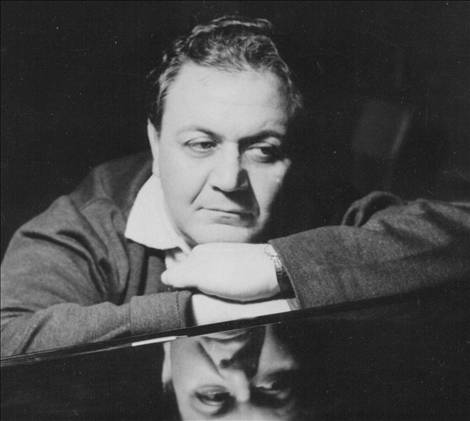
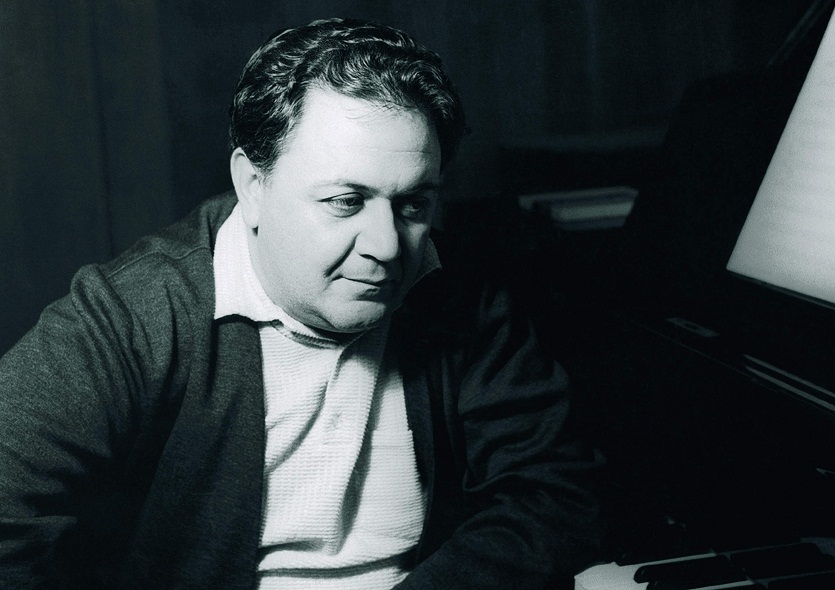
Manos Hatzidakis (Greek: Μάνος Χατζιδάκις) (October 23, 1925 – June 15, 1994) was a Greek composer and theorist of the Greek music. He was also one of the main prime movers of the "Éntekhno" song (along with Mikis Theodorakis). In 1960 he received an Academy Award for Best Original Song for his Song Never on Sunday from the film of the same name.
His very first work was the tune for the song "Paper Moon" ("Χάρτινο το Φεγγαράκι"), from Tennessee Williams' A Streetcar Named Desire staged by Karolos Koun's Art Theatre of Athens, a collaboration which continued for 15 years. His first piano piece, "For a Small White Seashell" ("Για μια Μικρή Λευκή Αχιβάδα"), came out in 1947 and in 1948 he shook the musical establishment by delivering his legendary lecture on rembetika, the urban folk songs that flourished in Greek cities, mainly Piraeus, after the Asia Minor refugee influx in 1922 and until then had heavy underworld and cannabis use connections and were consequently looked down upon. Hatzidakis focused on the economy of expression, the deep traditional roots and the genuineness of emotion displayed in rembetika, and exalted the likes of composers like Markos Vamvakaris and Vassilis Tsitsanis. Putting theory to practice, he adapted classic rembetika in his 1951 piano work, Six Folk Paintings (Έξι Λαϊκές Ζωγραφιές), which was later also presented as a folk ballet. In 1949 he co-founded the Greek Dance Theater Company with the choreographer Rallou Manou.
At this point he began writing immensely popular "pop" songs and movie soundtracks alongside more serious works, such as 1954's The C.N.S. Cycle (O Kyklos tou C.N.S.), a song cycle for piano and voice recalling the German lied in its form, if not in style. In 1955 he wrote the score for Michael Cacoyannis' film Stella, with actress Melina Mercouri, singing the movie's trademark song "Love that became a double - edged knife" ("Αγάπη που 'γινες δίκοπο μαχαίρι"). Hatzidakis always maintained that he wrote his serious pieces for himself and his less serious ones to make a living.
In 1959, Hatzidakis met Nana Mouskouri, his first "ideal interpreter", a skilled vocalist who shaped the sounds of his music. It was 1960 that brought him international success, as his song "Never on Sunday" ("Τα παιδιά του Πειραιά"), from Jules Dassin's film Never on Sunday (Ποτέ την Κυριακή), won him an Academy Award and became a worldwide hit.
In 1962, he produced the musical Dream Street (Οδός Ονείρων) and completed his score for Aristophanes' Birds (Όρνιθες), another Art Theater production which caused an uproar over Karolos Koun's revolutionary direction. The score was also used later by Maurice Béjart's 20th Century Ballets. He also wrote the music for a song which Arthur Altman added English lyrics to and gave to Brenda Lee. The song was "All Alone Am I". In 1964 he released the album 15 Vespers (Δεκαπέντε Εσπερινοί) with the famous song "Mr Antonis ("Ο Κυρ Αντώνης").
In 1965, his LP Gioconda's Smile (Το Χαμόγελο της Τζιοκόντας) was released on Minos - EMI. In 2004, it was re-released, digitally remastered as an audiophile LP and a CD in the EMI Classics collection. In 1966 he traveled to New York City for the premiere of Illya Darling, a Broadway musical based on Never on Sunday, which starred Mercouri. He did not return to Greece until 1972 due to his opposition to Greece's military dictatorship.
While in the United States he completed several more major compositions, including Rhythmology (Rythmologia) for solo piano, his compilation, Gioconda's Smile (produced by Quincy Jones), and the song cycle, Magnus Eroticus (Megalos Erotikos), in which he used ancient (Sappho, Euripides), medieval (stanzas from folk songs and George Hortatzis' romance Erophile) and modern (Dionysios Solomos, Constantine Cavafy, Odysseus Elytis, Nikos Gkatsos) Greek poems, as well as an excerpt from the Old Testament book "Wisdom of Solomon". His LP Reflections with the New York Rock & Roll Ensemble contained several of his most beautiful songs, either in orchestral form or with English lyrics written by the band - a record that preceded fusion trends by several decades.
Hatzidakis returned to Greece in 1972 and recorded Magnus Eroticus with singer Fleury Dantonaki, an opera trained alto and singer Dimitris Psarianos. Following the junta's overthrow, he became active in public life and assumed a number of positions in the Athens State Orchestra (KOA), the National Opera (ELS), and the National Radio (ERT). In 1985 he launched his own record company "Seirios" (Sirius). In 1988 he helped Foivos Delivorias get started in his singing career. In 1989 he founded and directed the Orchestra of Colours (Orhistra ton Chromaton), a small symphonic orchestra. He assumed the role of score composer for his friend Federico Fellini's films, following Nino Rota's death, but the collaboration never materialized because of Hatzidakis's mounting health problems.
He died on June 15, 1994 in Athens, aged 68, from heart disease and diabetes. His estate and archives were bequeathed to his adopted son, George Theophanopoulos - Hatzidakis. In 1999 the City of Athens dedicated Technopolis in his memory.